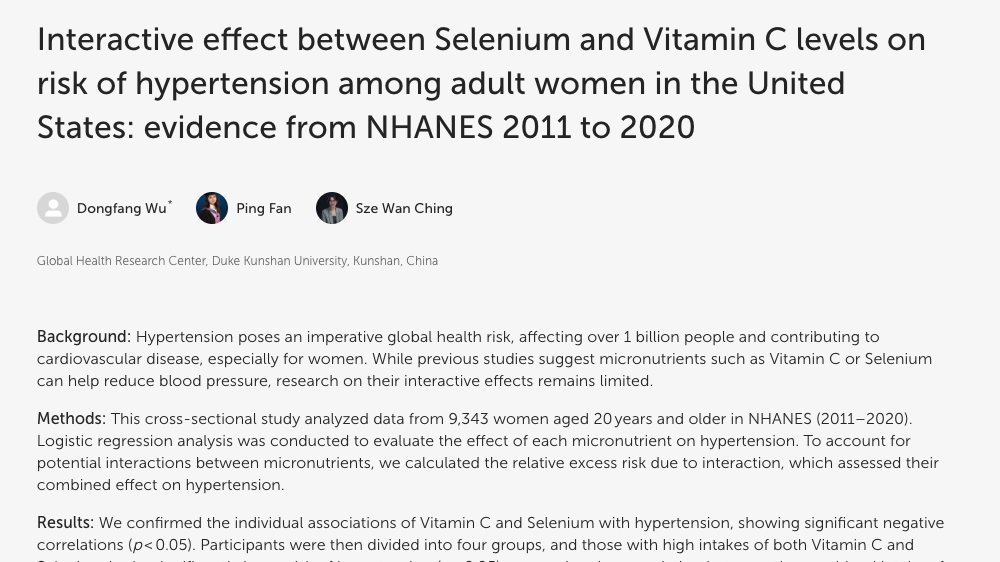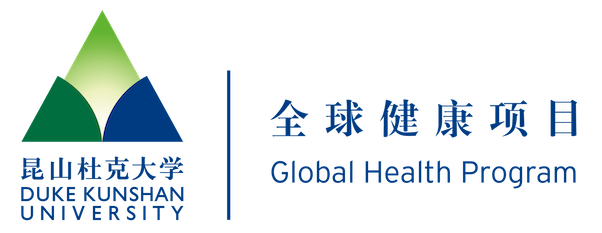In March, a research paper titled “Interactive Effect between Selenium and Vitamin C Levels on Risk of Hypertension among Adult Women in the United States: Evidence from NHANES 2011 to 2020” was published in Frontiers in Nutrition, an SCIE-indexed journal with an impact factor of 4.0. The paper was co-authored by Ping Fan, Julia Ching, and Dongfang Wu from Class of 2025, Duke Kunshan University’s Master of Science in Global Health program.

The study analyzed data from 9,343 adult women over the age of 20, sourced from the NHANES database between the years 2011 and 2020. Through relative excess risk due to interaction (RERI) analysis, it confirmed a significant negative correlation between the intake of individual nutrients and the risk of hypertension (p < 0.05), suggesting a potential association between the combined adequate intake of Vitamin C and Selenium with lowering blood pressure in adult women.
A Course Assignment
Originally, the study began as a final group assignment for the Biostatistics and Epidemiology II course. Encouraged by Dr. Chenkai Wu, the course instructor and Associate Professor of Global Health, the trio refined their work into a full manuscript. After eleven months of diligent effort, their paper was officially published in a prestigious SCIE-indexed journal.
Dr. Wu elaborated: “Biostatistics and Epidemiology is a core course in the Master of Science in Global Health program, spanning two semesters. The first semester covers foundational concepts and data analysis techniques, while the final assignment in the second semester integrates these skills and prepares students for their capstone thesis in the fourth semester.” He added that many students from former cohorts have successfully published their course assignments on peer review international journals.
The Test of Teamwork and Project Management
The project wasn’t just an individual task—it demanded teamwork, putting students’ collaboration and project management skills to the test. Recognizing the significance and representativeness of their work—from topic selection to findings, the group unanimously decided to turn their assignment into a journal article.
“Submitting to a journal meant our assignment needed a major overhaul, which really challenged our teamwork and academic writing,” said Dongfang Wu. Throughout the revision process, each member brought unique strengths to the table: Wu spearheaded topic selection, variable refinement, and data analysis; Ping Fan leveraged her background in Chinese literature to deepen the background research and literature review; and Julia Ching, an experienced academic writer, synthesized the methodology, crafted the discussion, and ensured grammatical precision.
The first draft, especially the data analysis section, was still rough around the edges. Under the guidance of Associate Professor Wu, the team pinpointed research gaps and sharpened their research questions and hypotheses. Through rigorous statistical validation and iterative refinement, they elevated the paper’s quality significantly.

As non-native English speakers, the group faced persistent language barriers. After completing their initial draft, they meticulously revised their work at Duke’s Thompson Writing Studio, which specializes in enhancing academic writing. Despite thorough edits, their first submission still had minor issues—capitalization inconsistencies, missing punctuation, and phrasing nuances. Before finalizing the manuscript, they painstakingly refined every sentence, enriching vocabulary while preserving clarity and original intent.
An incredible journey
Dongfang Wu shares, “As an introverted ‘I’ type personality, I have often been more comfortable working alone. This team writing experience has taught me to examine issues from multiple perspectives and to embrace constructive criticism that arises from different dimensions of thought. As the corresponding author, I was responsible for conveying editorial suggestions and coordinating tasks among team members who were spread across three time zones. Throughout this process, I have profoundly realized the limitations of individual capability and the crucial importance of communication.”
Julia Ching reflects, “Each of us has diverse experiences and strengths, as well as our unique styles of working. We each played to our strengths throughout the project, fostering teamwork and mutual encouragement. When problems arose, we were not hesitant to seek external help, ensuring the efficient and high-quality completion of the project.”
Ping Fan muses, “I would like to invoke poet W.H. Auden’s words to describe my experience with publishing this paper: ‘Language is the mother, not the handmaiden, of thought; words will tell you things you never thought or felt before.’ In the past, I was always eager to see immediate results, waiting anxiously and not reflecting on my abilities in time. The experience of publishing this paper and writing my thesis has taught me patience and perseverance. By accepting my shortcomings, seeking new knowledge on my own, and discussing solutions with teachers and classmates, I have managed to advance each task with a more serene mindset.”
Acknowledgments from the Team Members
We would like to extend our heartfelt gratitude to Jianhong Xu, Researcher Fellow of the Global Health Research Center for his detailed guidance on the data analysis for our paper. Our thanks also go to the E-fund, which provided full financial support for the publication of our article. Additionally, we greatly appreciate the unwavering support of the Global Health Program throughout the publication process of this paper.
Publication Link: https://www.frontiersin.org/journals/nutrition/articles/10.3389/fnut.2025.1534535/full

